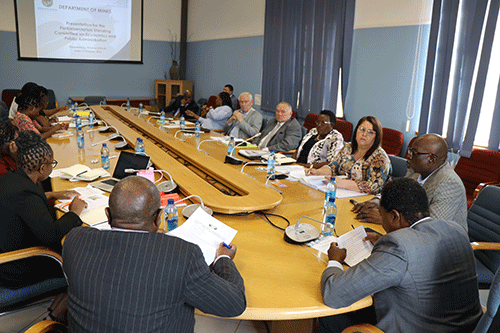George Sanzila
The Standing Committee on Economics and Public Administration held a consultative meeting yesterday with the ministry of mines to get clarification on how shareholding by government in the mining and exploration industry is determined.
It also discussed the effectiveness of exclusive processing licences (EPLs) in improving the living standards of Namibians and value addition to natural resources and minerals by right holders among others.
The committee has the mandate to monitor, enquire and make recommendations to the National Assembly on matters pertaining to the economy of the country. Chairperson of the committee, Natangwe Ithete in his opening statement said although Namibia is endowed with natural resources that could propel the country’s industrial development agenda, there are many impediments that are preventing the country and its citizens from benefiting optimally.
“The committee identified some challenges hampering industrialisation and trade enhancement in our country such as outdated laws and regulations, inadequate coordinated planning and implementation for joint projects, fragmented business support programmes, inadequate tax and non-tax based investment support and others,” noted Ithete. The deputy executive director and mining commissioner in the ministry of mines, Erasmus Shivolo, concurred with the sentiments, adding that mining remained the main contributor to Namibia’s economy by accounting for 13% of the gross domestic product (GDP) and that the process of reviewing the Minerals Act of 1992 was already underway to keep up with the changing dynamics in the industry.
He noted that currently, the Act does not explicitly state whether government can acquire shares in mineral rights even though section 49 makes provision for mineral agreements. He, however, noted that despite this anomaly, government currently owns a 50/50 shareholding in Namdeb, 3.4% in Rossing Uranium and that the State-owned mining company Epangelo has shares in Husab (10%), Navachab mine (7.5%), Kombat mine (10%) and several EPLs.
He further noted that the current law although under review has resulted in an increase in the number of Namibians benefiting and acquiring mineral rights. These rights administered by the ministry, include non-exclusive prospecting licence, mining claims, reconnaissance licence, exclusive reconnaissance licence, exclusive prospecting licence, mineral deposit retention licence and mining licence.
Members of parliament added to the growing chorus of criticism on the lack of benefits both to the country and people, especially at the grassroots level who continue to wallow in poverty despite the discovery of natural resources. There has also been a perceived lack of transparency in the awarding of mineral rights and concerns that licences are often turned into money making schemes by local rights holders without any value addition. Lawmakers were further not happy that despite mining companies amassing millions in profits, their philanthropic activities have not made any tangible and significant economic benefits to Namibians.
–George Sanzila works in the Division: Research, Information, Publications and Editorial Services at the National Assembly.



